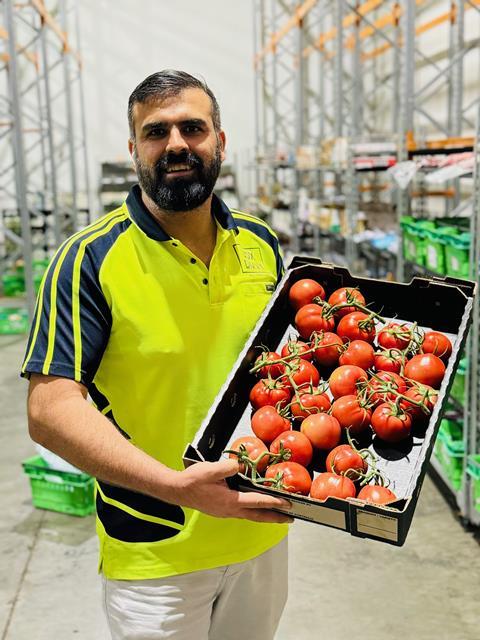Modern cooperative supports Australian growers through truss oversupply, paying up to double the market price
An oversupply of Australian truss tomatoes is driving market prices down and modern community-based cooperative Box Divvy is matching growers with consumers to encourage sustainable supply.

The glut follows inter-state movement restrictions as a result of the ToBRFV outbreak in South Australia as well as significant expansions in high and medium tech glasshouse production which has boosted yields.
“The virus was a tough blow,” said Matt McInerney, farm manager at K-Fresh, a family-run farm in Virginia, South Australia. “Even though it’s under control now, the restrictions have left us with more produce than we can sell. Prices have dropped through the floor, and it’s hard to make ends meet in a situation like this.”
To help combat this issue and support growers Box Divvy has developed a business model it said pays growers their break-even price rather than the market price.
According to the company, tomato prices have dropped to as low as A$4 per 5kg tray (A$0.8/kg). This pricing is well below the break-even price of around A$8 per tray (or $1.60/kg) that growers need to cover their costs, leaving many at risk of financial losses.
“At Box Divvy, we’re focused on building a more sustainable food system,” co-founder Anton van den Berg said. “We asked the grower for their break-even price and paid it because supporting farmers through tough times ensures the long-term viability of local agriculture.”
Box Divvy is selling truss tomato 5kg trays to its members for A$10 encouraging them to order as many as possible to help address the glut.
“At A$2 a kilogram, these fresh, Australian-grown, truss tomatoes are even cheaper than the lowest-priced imported canned tomatoes,” van den Berg said. “It’s proof that sustainability and affordability can go hand in hand.”
Box Divvy has committed to price transparency to create a poinnt of difference from other retailers. Its members know exactly how much they are paying for produce, what portion of the price goes to the grower, and how the overall cost compares to supermarket prices. According to Box Divvy, this level of openness ensures fairness for growers and consumers while fostering trust within the community.
The network also helps reduce food waste by connecting surplus produce with communities, ensuring no fresh food is unnecessarily lost.
The cooperative currently has 296 hubs and 13,000 members but is expanding rapidly, opening one to two new hubs each week. Hubs are run by ‘Hubsters’, community members who act as a conduit for the service distributing produce to users.
“By supporting growers, offering pricing transparency, and minimising waste, we’re creating a system that benefits both farmers and families,” van den Berg said.
“Transparency is key – it ensures fairness for farmers, value for consumers, and accountability across the food industry. It’s time to take a closer look at how our food is priced and who it impacts.”



